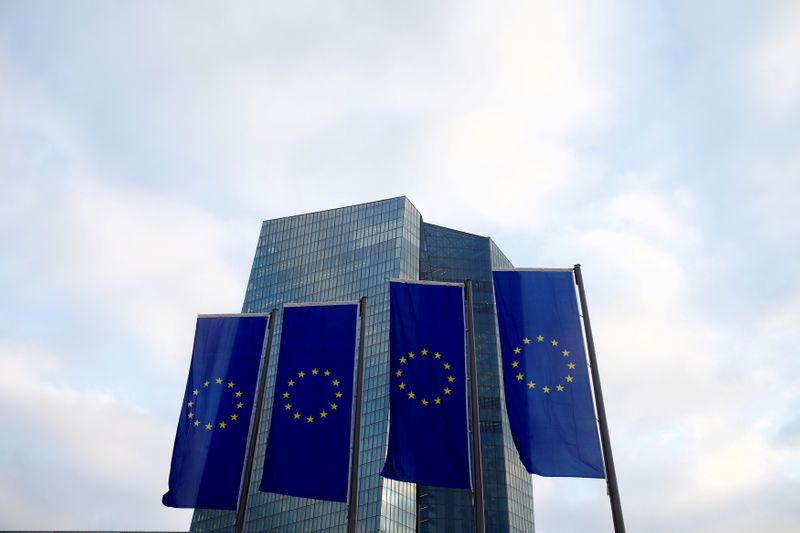FRANKFURT (Reuters) – European Central Bank policymakers are homing in on a temporary increase in the regular bond purchase scheme that would still significantly reduce overall debt buys once a much larger pandemic-fighting scheme ends in March, sources told Reuters.
The move, to be discussed at a meeting of the Governing Council on Dec. 16, would aim to keep bond yields in check even after the ECB’s 1.85 trillion euro ($2.09 trillion) Pandemic Emergency Purchase Programme ends, while not committing too much firepower at a time when inflation is already high and the growth outlook is uncertain.
Conversations with six sources with direct knowledge of the debate indicate that a compromise is forming around beefing up the long-running Asset Purchase Programme (APP) but there would be limits on the size and time of the commitment, leaving policymakers with the usual flexibility to tailor policy later.
While the details of this boost are still open, the sources said that the ECB could do one of two things. It could approve a purchase envelope until the end of the year, with the caveat that not all of it must be spent.
Alternatively, it could lift the buys for a shorter period with the pledge that the purchases would still continue thereafter, but their size would be discussed later and would likely fall, if the economy develops as expected.
In any case, the bond buys from April would be significantly smaller than the combined volume of the emergency and legacy programmes used now.
An ECB spokesperson declined to comment. The sources added that no decision has been made and the debate remains vibrant.
NO RATE HIKE
Under the likely options, the ECB’s commitment would not reach beyond 2022, a key issue for conservatives, or hawks, who fear that inflation might not fall below the 2% target, as now expected.
Still, some want to make clear that purchases will continue until at least the end of 2022 to squash rate hike bets, as the bank’s guidance now rules out a rate increase while bond buys continue.
The unusually lively debate is fuelled by diverging views on inflation. Doves, including chief economist Philip Lane, see it falling quickly next year, then languishing below target for years to come. Conservatives meanwhile see a risk that inflation gets stuck above 2%.
Although hawks are now campaigning for no increase in bond purchases under the APP, currently running at 20 billion euros a month, many privately admit that going cold turkey is simply too risky, so an increase is needed to buffer against markets’ turbulence.
Their demand, however, is higher-than-usual flexibility and optionality that would require the bank to reconfirm stimulus volumes regularly, much like it did in recent quarters when emergency purchase volumes were decided every second meeting.
An open-ended increase in the bond buys is highly unlikely, the sources said, as is the creation of an entirely new programme, as advocated by some policymakers.
While some are pushing for a delay in key decisions given the murky outlook, the sources said that a call on ending PEPP is unavoidable while at least the cornerstone decision regarding the APP is also necessary, with some technical details left to be ironed out.
One of these details could be flexibility. The legacy scheme is governed by more rigid rules and some policymakers want at least part of the emergency scheme’s flexibility carried over. But there is no urgency in this decision as the APP is not yet at risk of being constrained, some of the sources said.
Another item that can wait is a debate on revising the guidance that now stipulates a rate hike “shortly after” bond buys end.
The sources added that the ECB could signal that the emergency scheme would remain ready to be deployed even beyond March 31 and the roughly 100 billion euros left in it could then be used in case of undue market turbulence.
They also said that the ECB could exercise flexibility in how it reinvests funds in the emergency scheme. Cash from expiring debt is rolled back into the market but could be used flexibly, with focus on markets that may be experiencing stress.
($1 = 0.8832 euros)
(Reporting by Balazs Korany and Francesco Canepa; Editing by Susan Fenton)


























